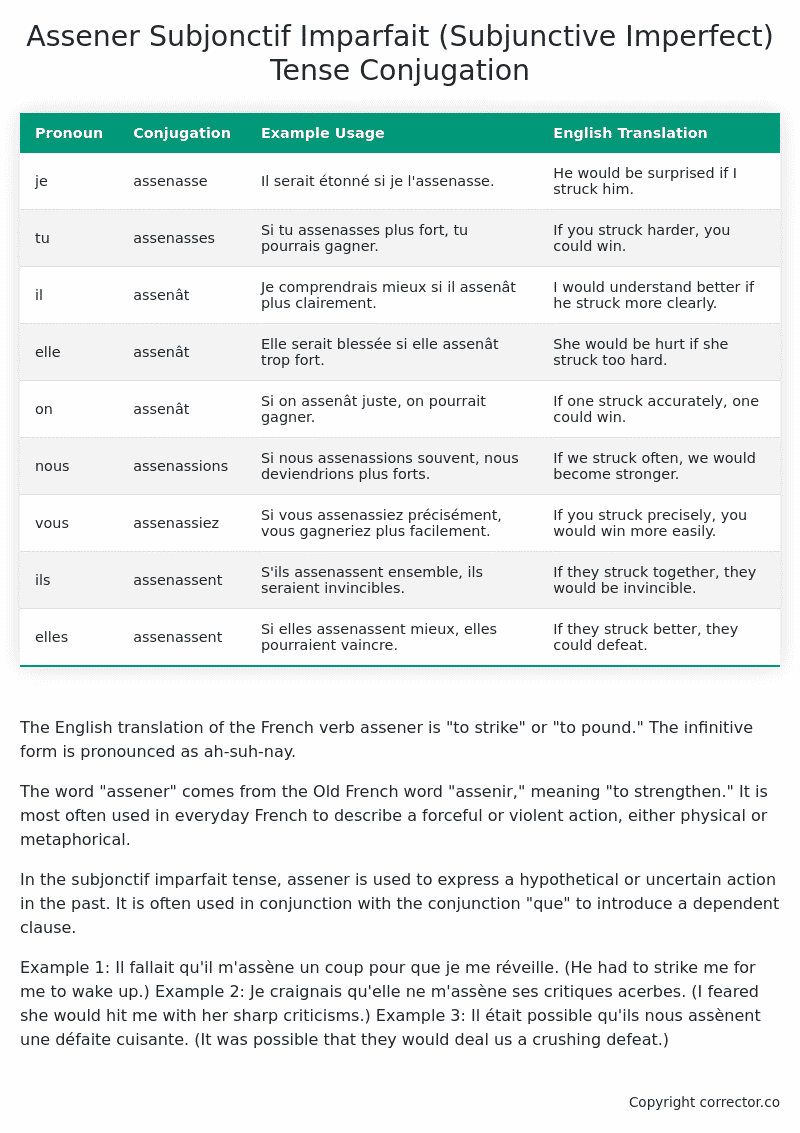Subjonctif Imparfait (Subjunctive Imperfect) Tense Conjugation of the French Verb assener
Introduction to the verb assener
The English translation of the French verb assener is “to strike” or “to pound.” The infinitive form is pronounced as ah-suh-nay.
The word “assener” comes from the Old French word “assenir,” meaning “to strengthen.” It is most often used in everyday French to describe a forceful or violent action, either physical or metaphorical.
In the subjonctif imparfait tense, assener is used to express a hypothetical or uncertain action in the past. It is often used in conjunction with the conjunction “que” to introduce a dependent clause.
Example 1: Il fallait qu’il m’assène un coup pour que je me réveille. (He had to strike me for me to wake up.)
Example 2: Je craignais qu’elle ne m’assène ses critiques acerbes. (I feared she would hit me with her sharp criticisms.)
Example 3: Il était possible qu’ils nous assènent une défaite cuisante. (It was possible that they would deal us a crushing defeat.)
Table of the Subjonctif Imparfait (Subjunctive Imperfect) Tense Conjugation of assener
| Pronoun | Conjugation | Example Usage | English Translation |
|---|---|---|---|
| je | assenasse | Il serait étonné si je l’assenasse. | He would be surprised if I struck him. |
| tu | assenasses | Si tu assenasses plus fort, tu pourrais gagner. | If you struck harder, you could win. |
| il | assenât | Je comprendrais mieux si il assenât plus clairement. | I would understand better if he struck more clearly. |
| elle | assenât | Elle serait blessée si elle assenât trop fort. | She would be hurt if she struck too hard. |
| on | assenât | Si on assenât juste, on pourrait gagner. | If one struck accurately, one could win. |
| nous | assenassions | Si nous assenassions souvent, nous deviendrions plus forts. | If we struck often, we would become stronger. |
| vous | assenassiez | Si vous assenassiez précisément, vous gagneriez plus facilement. | If you struck precisely, you would win more easily. |
| ils | assenassent | S’ils assenassent ensemble, ils seraient invincibles. | If they struck together, they would be invincible. |
| elles | assenassent | Si elles assenassent mieux, elles pourraient vaincre. | If they struck better, they could defeat. |
Other Conjugations for Assener.
Le Present (Present Tense) Conjugation of the French Verb assener
Imparfait (Imperfect) Tense Conjugation of the French Verb assener
Passé Simple (Simple Past) Tense Conjugation of the French Verb assener
Passé Composé (Present Perfect) Tense Conjugation of the French Verb assener
Futur Simple (Simple Future) Tense Conjugation of the French Verb assener
Futur Proche (Near Future) Tense Conjugation of the French Verb assener
Plus-que-parfait (Pluperfect) Tense Conjugation of the French Verb assener
Passé Antérieur (Past Anterior) Tense Conjugation of the French Verb assener
Futur Antérieur (Future Anterior) Tense Conjugation of the French Verb assener
Subjonctif Présent (Subjunctive Present) Tense Conjugation of the French Verb assener
Subjonctif Passé (Subjunctive Past) Tense Conjugation of the French Verb assener
Subjonctif Imparfait (Subjunctive Imperfect) Tense Conjugation of the French Verb assener (this article)
Subjonctif Plus-que-parfait (Subjunctive Pluperfect) Tense Conjugation of the French Verb assener
Conditionnel Présent (Conditional Present) Tense Conjugation of the French Verb assener
Conditionnel Passé (Conditional Past) Tense Conjugation of the French Verb assener
L’impératif Présent (Imperative Present) Tense Conjugation of the French Verb assener
L’infinitif Présent (Infinitive Present) Tense Conjugation of the French Verb assener
Struggling with French verbs or the language in general? Why not use our free French Grammar Checker – no registration required!
Get a FREE Download Study Sheet of this Conjugation 🔥
Simply right click the image below, click “save image” and get your free reference for the assener Subjonctif Imparfait tense conjugation!

Assener – About the French Subjonctif Imparfait (Subjunctive Imperfect) Tense
Formation
Common Everyday Usage Patterns
Interactions with Other Tenses
Subjonctif Présent
Indicatif Passé Composé
Conditional
Conditional Perfect
Summary
I hope you enjoyed this article on the verb assener. Still in a learning mood? Check out another TOTALLY random French verb conjugation!


